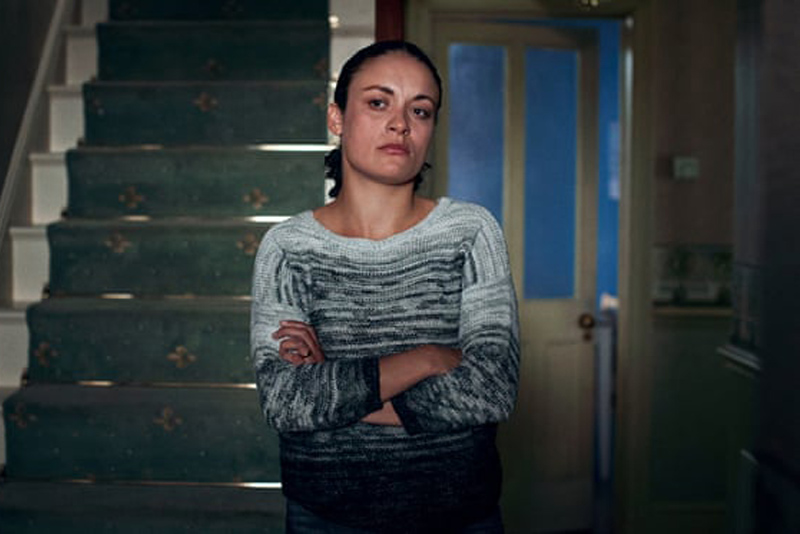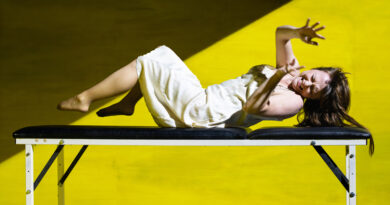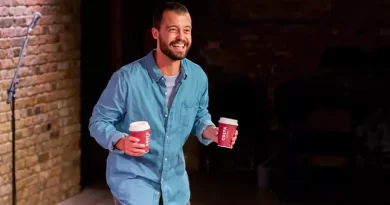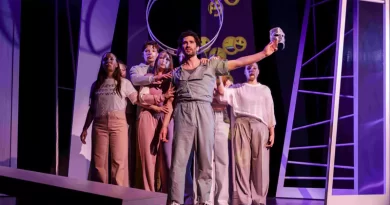“The Outside Dog” and “The Hand of God”, the Bridge Theatre
Jay Paul Skelton on the South Bank
1 September 2020
Alan Bennett’s celebrated Talking Heads monologues were first broadcast by the BBC in two series of six, in 1988 and 1998. Subsequently, they were adapted for the radio and for stage. During the Covid-19 lockdown in spring of this year [2020] when theatres were closed, London Theatre Company (which operates the Bridge Theatre, led by artistic director Nicholas Hytner) filmed ten of the original monologues plus two new ones under strict conditions of social distancing. Just as before, they were performed by a cast of well-known, mainly female actors, with high-level directors, and received much acclaim when aired on BBC One in June. In the autumn, the Bridge Theatre staged eight of these monologues in four double bills, created by the same talented artists.
The challenge with attending a theatre production in the midst of a global pandemic is the possibility that your experience becomes about attending a theatre production in the midst of a global pandemic. The navigation of public transport, the carefully staggered audience arrival times, the taking of temperatures as you enter the building, the mandatory wearing of face masks, the tentative order for a glass of wine or freshly baked treat from the bar, and the ongoing dance of social distancing at every turn can overwhelm the actual performance. I can’t say these concerns were completely dispelled by the Bridge Theatre’s recent production of eight monologues from Alan Bennett’s Talking Heads series, but what a delight to return to live performances when offered with such care and consideration.
I’m not only referring to the practical care provided by the Bridge, but also the artistic consideration of the first double bill I attended: The Outside Dog and The Hand of God. l’m unsure if it was deliberate on the part of artistic director Nicholas Hytner, but the bewilderment that Bennett’s characters displayed on stage in the midst of relating events often beyond their control appeared to resonate with the current moment. Well, these women collectively seemed to sigh: “How did l get here of all places?”

Kristin Scott Thomas as Celia in The Hand of God.
Photo credit: Zac Nicholson.
I’ve always found these monologues to be rich, well-observed character studies, but it wasn’t until this production that l understood their ability to resonate beyond their otherwise circumscribed worlds. I didn’t just listen to these stories at the Bridge, I was part of them thanks to the imposition of current events. For example, as Celia, played by Kristin Scott Thomas in The Hand of God, realized the metaphorical rug had been pulled out from under her by a savvy customer, I was right there with her. Or in The Outside Dog, as the growing chasm between Marjory, played by Rochenda Sandall, and her husband became all too clear, the distance between me and my fellow audience members became all too palpable.
The choice by the Bridge Theatre to produce these plays appeared comforting and canny Bennett has embodied a distinctively British mix of wry observation and deep compassion throughout his long career, and theatregoers have responded by flocking to his plays, buying tickets to his movies, and purchasing his books without hesitation. In short, he’s a sure bet for good returns. However, in this instance he serves as secure ground in a wildly unpredictable landscape, a familiar voice that reminds us that there are some constants in a world turned upside down. Yet this material is anything but safe as these two monologues alone feature murder, betrayal, and what one might refer to as elder abuse. The superficial coziness of Bennett’s portraits gradually reveals a darkness that takes on greater weight under the current circumstances.
This particular double bill embraced that juxtaposition in almost every aspect. The brightness of Marjory’s kitchen in The Outside Dog, directed by Nadia Fall, or the amber warmth of Celia’s shop in The Hand of God, directed by Jonathan Kent, are established immediately by the interplay between Bunny Christie’s carefully placed screens, Luke Halls’ evocative video projections, and Jon Clark’s responsive lighting design.

Rochenda Sandall in The Outside Dog.
Photo credit: Zac Nicholson
Scott Thomas, luminous as the ageing antiques dealer in The Hand of God, emphasized the humour of the script at the start but gives way to the aching sadness of a woman for whom time — and a priceless artifact — has slipped unknowingly from her fingers.
Sandall, navigating the more preternatural story of the evening, follows a similar path in The Outside Dog by first leaning into the irritation Marjory feels at her husband’s devotion to his Alsatian but then slowly revealing the raw vulnerability of a horrifyingly abused spouse.
Both performers allowed silence to speak volumes as their respective stories unraveled, giving us the opportunity to fully engage in the bafflement each woman experiences. The relative brevity of the evening, which ran about one hour (with no interval), allowed space for such moments to breathe without losing momentum. Any other shifts in time within each monologue, whether seconds or days, were elegantly supported throughout by George Fenton’s music.
It’s uncertain as to whether these monologues would have been programmed by the Bridge in a regular season given their high level of familiarity. (In fact, they’re such a part of British culture that they’ve been featured in the A-Level and GCSE English Literature syllabus for younger people.) However, these expertly realized monologues reflected the need for people to gather round, share stories, and find humanity in the most challenging of circumstances.









